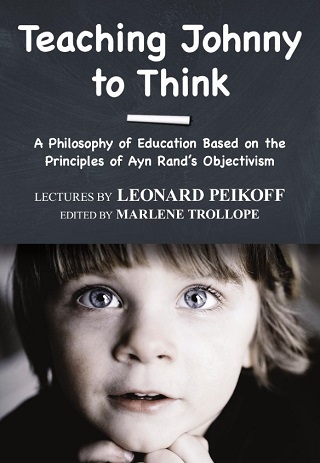 While walking to the classroom with a couple of close friends, as soon as I finished explaining a concept one of them had difficulty with, he remarked, "you have a knack for making a complex subject simple to grasp." Though I still cherish that remark some forty years later, I never explored the subject of education to uncover what makes great teachers. It took the startling clarity on the subject of teaching in the book Teaching Johnny to Think that finally closed the loop for me as to why my friend had made the remark he did. Presenting knowledge using reason is the only way to elicit an "aha" moment. How do you present knowledge using reason? That is what this book is about.
While walking to the classroom with a couple of close friends, as soon as I finished explaining a concept one of them had difficulty with, he remarked, "you have a knack for making a complex subject simple to grasp." Though I still cherish that remark some forty years later, I never explored the subject of education to uncover what makes great teachers. It took the startling clarity on the subject of teaching in the book Teaching Johnny to Think that finally closed the loop for me as to why my friend had made the remark he did. Presenting knowledge using reason is the only way to elicit an "aha" moment. How do you present knowledge using reason? That is what this book is about.
The book is short at 106 pages. Leonard Peikoff frames the narrative by exploring the reasons behind the low scores kids from American schools manage when academic achievement tests are given to middle school students across industrialized nations. He identifies the culprit to be the Dewey philosophy of education that is prevalent in our schools. He leads the reader through the five theories of education that developed from ancient to modern times: Classical, Socialization, Child-Centered, Moral, and Cognitive. He identifies the common trait found in three of the five theories as the basis of Dewey's philosophy of education before proceeding to show why that trait is bound to lead to deficiencies in education. He points out the common trait that unites the three theories as disregard for reason. He then merges the traits of the Classical and Cognitive theories and proceeds to develop a unified philosophy of education that is founded on reason. The purpose of high-school education he states is to take a perceptual creature (human child) and through training across many years, help him emerge as a mature, cognitively self-sufficient, informed being. Note that cognitive self-sufficiency is a key attribute of maturity and is required for a student to become informed in areas he is new to.
With the goal of delivering cognitive self-sufficiency, he proceeds to define the principles of teaching and the methods needed to attain that goal. The proper curriculum for elementary and secondary education, he states, should be delimited to only the core subjects of human knowledge. He finishes the book by exploring what skills teachers need to be successful.
Whether you write or lecture to teach, this book covers every essential topic that underlies the act of educating another. It covers motivation, method, and structure and explains why these are the essentials that must exist for knowledge to have a chance to move from teacher to student. Ignore the knowledge encapsulated in this short but ground-breaking work at your own peril. With the very best wishes in your journey as a teacher.
